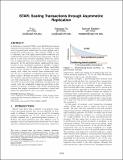STAR: scaling transactions through asymmetric replication
Author(s)
Lu, Yi; Yu, Xiangyao; Madden, Samuel
DownloadPublished version (756.4Kb)
Publisher with Creative Commons License
Publisher with Creative Commons License
Creative Commons Attribution
Terms of use
Metadata
Show full item recordAbstract
© 2019, is held by the owner/author(s). In this paper, we present STAR, a new distributed in-memory database with asymmetric replication. By employing a singlenode non-partitioned architecture for some replicas and a partitioned architecture for other replicas, STAR is able to efficiently run both highly partitionable workloads and workloads that involve cross-partition transactions. The key idea is a new phase-switching algorithm where the execution of single-partition and cross-partition transactions is separated. In the partitioned phase, single-partition transactions are run on multiple machines in parallel to exploit more concurrency. In the single-master phase, mastership for the entire database is switched to a single designated master node, which can execute these transactions without the use of expensive coordination protocols like twophase commit. Because the master node has a full copy of the database, this phase-switching can be done at negligible cost. Our experiments on two popular benchmarks (YCSB and TPC-C) show that high availability via replication can coexist with fast serializable transaction execution in distributed in-memory databases, with STAR outperforming systems that employ conventional concurrency control and replication algorithms by up to one order of magnitude.
Date issued
2019Department
Massachusetts Institute of Technology. Computer Science and Artificial Intelligence LaboratoryJournal
Proceedings of the VLDB Endowment
Publisher
VLDB Endowment